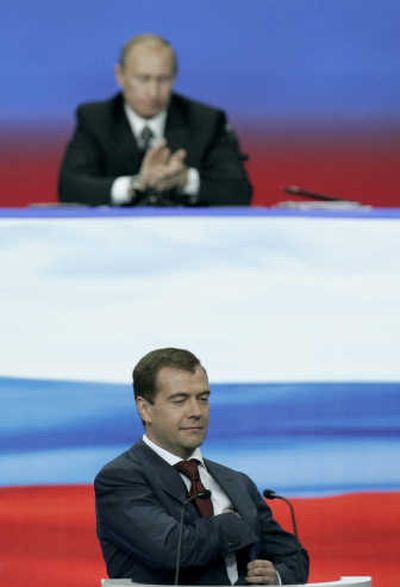Putin says he’d be prime minister

MOSCOW – President Vladimir Putin said Monday that he will accept the post of prime minister next year if, as is almost certain, his anointed successor Dmitry Medvedev is elected president in March.
“If Russian citizens express their confidence in Dmitry Medvedev and elect him as the country’s president, I will be ready to head the government,” said Putin, speaking to a congress of the pro-Kremlin United Russia party, which nominated Medvedev as its presidential candidate Monday.
Putin, 55, also said he will not support changing the Russian constitution to bolster his new – and theoretically weaker – post. He said he had complete confidence in Medvedev as Russia’s new leader and would be ready to work with him “without changing the distribution of powers between the presidency and government.”
We “shouldn’t be ashamed or afraid of transferring the key powers of the country, the destiny of Russia, to the hands of such a man,” said Putin in a short address to a packed gathering at a conference center near the Kremlin.
The announcement was foreshadowed last week when Medvedev, after Putin endorsed him for the presidency, announced that he would like his boss and mentor to take the position of prime minister.
Neither Putin nor Medvedev, who walked into the congress together, said how they will share power. The prime minister, who serves at the president’s pleasure, is a great deal less powerful under the constitution than the man who sits in the Kremlin. And Russian prime ministers have long been tasked with both faithfully implementing the president’s policies and loyally taking the fall when they fail.
Analysts said it is hard to imagine the extremely powerful and popular Putin acting as a subordinate to his untested 42-year-old protege. And speculation over Putin’s future, which has raged for months, is only likely to continue into a new administration.
“Personality may be more important than the constitution in this case,” said Georgy Bovt, editor in chief of Profil magazine, in an interview. “Formal law is not always very important in Russia. The speculation will just continue. It’s what makes Russian politics so interesting.”
Bovt said Putin may be carving out a new model of governance whose form will only become apparent next year. Or, he said, Putin’s stint as prime minister may be a short-term measure while Medvedev establishes his own power base within the fractious confines of the political elite.
“When he backed Medvedev, he made a very definite choice among the Kremlin factions, and it will be very difficult for him to control any coming struggles without a formal role,” Bovt said.